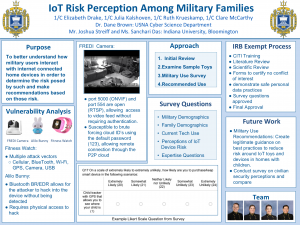Four students from the U.S. Naval Academy at Annapolis are on target to complete their year-long capstone project internship with the Luddy School of Informatics, Computing, and Engineering’s Security & Privacy in Informatics, Computing, and Engineering (SPICE) Center.
Capstone internships consist of a two-semester course paired with industry or research partners in which students earn research experience while working on real-world projects in a professional setting. The project, “IoT Risk Perception among Military Families,” saw the midshipmen first learning the process of threat modeling Internet of Things (IoT) products by selecting and testing a range of home smart devices, including nanny cameras, GPS watches, and children’s toys.
Testing was done at the Naval Academy under the remote guidance of IoT house project manager Joshua Streiff, with whom the midshipmen initiated the study at last year’s SPICE-sponsored Women in Cyber Security (WiCyS 2019) conference. Streiff who mirrored research at the IoT house to verify results. Various vulnerabilities were investigated including video stream theft, unchangeable default passwords, and potential data access to unauthorized and improperly protected cloud accounts. As Streiff states,
Although SPICE has a significant history of research with military branches, bases, and personnel – this was the IoT house’s first remote capstone with undergraduate students from a military college,” said IoT house project manager Joshua Streiff, with whom the midshipmen initiated the study at last year’s SPICE-sponsored Women in Cyber Security (WiCyS 2019) conference. “Their dedication and focus made their challenge of learning cybersecurity skills and lab processes possible despite the physical distance. They learned to do both technically challenging work and pivot to human studies design and implementation in one year.
The second semester was dedicated to developing and implementing a survey of military families with the long-term goal of writing an advisory policy on IoT toys for military families. Completed under the direction of Luddy Ph.D. candidate Sanchari Das and Professor L Jean Camp, the students learned the proper human-centered research processes, designed a scientifically valid questionnaire, and navigated an Internal Review Board with the hope of beginning data collection by the end of the academic year. Das reflects, the experience is valuable to student and teacher alike,
It was my honor to work with these truly brilliant women. They have inspired me with their miltary service and in their dedication to the work of their capstone project. They were so self-motivated that my work was made very easy. Working with Professor Camp, Joshua, and the capstone students has been a great learning experience for me. I congratulate our lab, who has always been welcoming to hard-working students by supporting their projects and to WiCyS, who has been a prominent strength in promoting women in technology.
As the undergraduate college of our country’s naval service, the Naval Academy prepares young women and men to become professional officers of competence, character, and compassion in the U.S. Navy and Marine Corps. Naval Academy students are midshipmen on active duty in the U.S. Navy. They attend the academy for four years, graduating with Bachelor of Science degrees and commissions as ensigns in the Navy or second lieutenants in the Marine Corps.
Indiana University’s IoT House hosts students and a unique residential research space in which the human and technical aspects of IoT are investigated in a multidisciplinary manner. One of SPICE’s goals is outreach to the public; sharing research knowledge in forms that are usable and impactful. By providing a collaborative space allowing Luddy students, faculty, staff, and partners from other universities to pursue essential technology solutions, the IoT House ensures that the human, technical, and broader impacts are at the forefront of innovation.




